Executive Committee

The Executive Committee is composed of nine individuals and a Chair, representing various diverse backgrounds and interests in shorebird conservation. Besides the Chair, the Executive Committee includes a Secretary, Treasurer, the past Chair, Conference Coordinator, a MSc or PhD graduate student studying shorebirds, and a representative from each of the following portions of the Western Hemisphere: Canada and the United States, Mexico and Central America, Northern South America and the Southern Cone of South America.
The Executive Committee is responsible for:
- Assisting in organizing and planning meetings of the WHSG
- Soliciting and assembling agenda items from group members to be presented at WHSG meetings
- Collectively prioritizing needs and seeking ways of getting work accomplished
- Providing written recommendation on advisory or policy issues presented to the WHSG from non-members or on advisory or policy issues deemed pertinent to the WHSG interests
Executive Committee Members
Chair
etavera@corbidi.org
Eveling Tavera Fernandez
Eveling Tavera Fernandez is a shorebird ecologist, born and raised in Lima, Peru. Her passion for 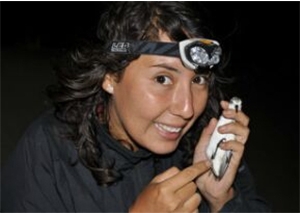 shorebirds started in 2010 after an amazing internship with the Wash Wader Ringing Group in UK. A year after she started the Paracas Shorebird Project in Peru to dedicate herself to the study of shorebirds in her country. She is also the Director of the Peruvian Bird Banding Program led by the Center of Ornithology and Biodiversity (CORBIDI) and Director At Large of the North American Banding Council (NABC) Shorebird Committee. She is currently a research associate at the University of Saskatchewan in Canada, and also affiliated with the Center for Ornithology and Biodiversity.
shorebirds started in 2010 after an amazing internship with the Wash Wader Ringing Group in UK. A year after she started the Paracas Shorebird Project in Peru to dedicate herself to the study of shorebirds in her country. She is also the Director of the Peruvian Bird Banding Program led by the Center of Ornithology and Biodiversity (CORBIDI) and Director At Large of the North American Banding Council (NABC) Shorebird Committee. She is currently a research associate at the University of Saskatchewan in Canada, and also affiliated with the Center for Ornithology and Biodiversity.
Past Chair
fraser@vt.edu
Jim Fraser

Jim Fraser started working on shorebirds in 1986 with his first piping plover graduate student. He and his lab have worked on migratory and breeding shorebirds and seabirds since then. Focal species have included piping plovers, red knots, and the more than 30 species that migrate through Virginia.
Lab information can be found at https://www.vtshorebirds.fishwild.vt.edu/index.html
Secretary
copalita@gmail.com
Abril Copalli Heredia Morales
Abril Heredia is a bird biologist, 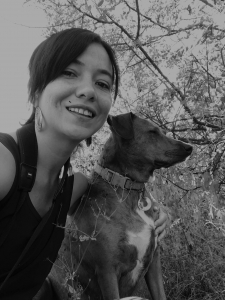 born in Mexico City. For eight years she has been involved in several bird ecology projects in different habitats of North America from the boreal forest, prairies, and Pacific coasts. She obtained her master’s degree in Centro de Investigación Científica y de Educación Superior de Ensenada (CICESE) by conducting a study on the effect of human disturbance in shorebirds in Todos Santos Bay, Baja California. She is currently conducting winter surveys of shorebirds and Black Brant with Terra Peninsular in the peninsula of Baja California and collaborating with the Pacific Shorebird Conservation Inititative as a member of the community of practice to reduce human disturbance to shorebirds in coastal Latin America.
born in Mexico City. For eight years she has been involved in several bird ecology projects in different habitats of North America from the boreal forest, prairies, and Pacific coasts. She obtained her master’s degree in Centro de Investigación Científica y de Educación Superior de Ensenada (CICESE) by conducting a study on the effect of human disturbance in shorebirds in Todos Santos Bay, Baja California. She is currently conducting winter surveys of shorebirds and Black Brant with Terra Peninsular in the peninsula of Baja California and collaborating with the Pacific Shorebird Conservation Inititative as a member of the community of practice to reduce human disturbance to shorebirds in coastal Latin America.
Treasurer
sbrown@manomet.org
Stephen Brown
Stephen Brown (Treasurer) is the Vice President for Shorebird Conservation at Manomet, and leads the  Shorebird Recovery Program, which is focused on restoring populations of shorebirds through science, site conservation, and habitat management. Because the causes of shorebird declines are not well understood, we work across their entire range and conduct original science to help learn what limits shorebird populations. To address some of the problems that are contributing to the declines, Manomet trains managers to create and restore critical habitats, and continues to build on the extensive WHSRN network of conservation sites and partners throughout the Hemisphere.
Shorebird Recovery Program, which is focused on restoring populations of shorebirds through science, site conservation, and habitat management. Because the causes of shorebird declines are not well understood, we work across their entire range and conduct original science to help learn what limits shorebird populations. To address some of the problems that are contributing to the declines, Manomet trains managers to create and restore critical habitats, and continues to build on the extensive WHSRN network of conservation sites and partners throughout the Hemisphere.
Mexico and Central America Representative
danymichgamez@gmail.com
Daniela Michelle Valdez Gámez
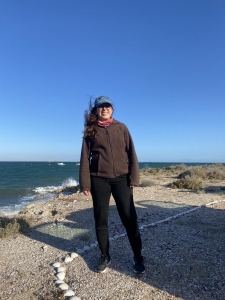
Daniela Michelle Valdez Gámez is a Ph.D. Mexican student at Autonomous University of Baja California Sur (UABCS); she is specializing in Conservation Biology. She is a Marine Biologist graduated from UABCS, and in 2021 she received a master’s degree in Marine Ecology at the same university; her thesis was about Breeding Ecology of Wilson’s Plover. She has worked with shorebirds since 2015 and she has participated five years in the Migratory Shorebird Project. She is a science communicator and content creator, and uses social networks to share information about nature.
Northern South America Representative
cancerbero.aaq@gmail.com
Alexis Araujo Quintero
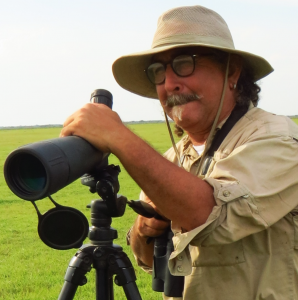 Alexis Araujo Quintero is a ornithology and mammalogist researcher from Universidad Nacional de Los Llanos Occidentales “Ezequiel Zamora” (UNELLEZ), Guanare Portuguesa state, Venezuela. He is professor of biology, ecology and wildlife management in pregrade and post grade levels. Since 2000 has dedicated to study shorebirds in Midcontinental enviroments like rice fields, another artificial wetlands and cattle ranchs in venezuelan Llanos. He is currently studying a doctorate in advanced biotechnology (bioinformatic) evaluating critical areas of migratory connectivity and conservation for shorebirds in the bioregion. Alexis has also worked on shorebirds field research projects in Morrocoy national park and Cuare wildlife refuge, Falcón state.
Alexis Araujo Quintero is a ornithology and mammalogist researcher from Universidad Nacional de Los Llanos Occidentales “Ezequiel Zamora” (UNELLEZ), Guanare Portuguesa state, Venezuela. He is professor of biology, ecology and wildlife management in pregrade and post grade levels. Since 2000 has dedicated to study shorebirds in Midcontinental enviroments like rice fields, another artificial wetlands and cattle ranchs in venezuelan Llanos. He is currently studying a doctorate in advanced biotechnology (bioinformatic) evaluating critical areas of migratory connectivity and conservation for shorebirds in the bioregion. Alexis has also worked on shorebirds field research projects in Morrocoy national park and Cuare wildlife refuge, Falcón state.
Southern South America Representative
veronicalauradamico@gmail.com
Veronica (Vero) D’Amico
Verónica (Vero) D’Amico (Southern South America representative) is a shorebird researcher at the Consejo  Nacional de Investigaciones Científicas y Técnicas (CONICET) and lives in Puerto Madryn, Patagonia, Argentina. Her research activities are focused mostly on shorebirds located in Argentina but in other Latin American countries as well. Her studies focus on population distribution, migration strategies, feeding ecology, parasites and pathogens, physiology and health condition. She wrote three academic theses related to her studies on shorebirds, publishes extensively, supervises graduate students, organizes postgraduate courses, and acts as reviewer for many scientific journals, doctoral thesis and research projects. Her current long-term project investigates how the physical condition and health status of coastal shorebirds makes them vulnerable to natural and man-made changes. She also works with other animal populations that are under the influence of natural changes and human activities.
Nacional de Investigaciones Científicas y Técnicas (CONICET) and lives in Puerto Madryn, Patagonia, Argentina. Her research activities are focused mostly on shorebirds located in Argentina but in other Latin American countries as well. Her studies focus on population distribution, migration strategies, feeding ecology, parasites and pathogens, physiology and health condition. She wrote three academic theses related to her studies on shorebirds, publishes extensively, supervises graduate students, organizes postgraduate courses, and acts as reviewer for many scientific journals, doctoral thesis and research projects. Her current long-term project investigates how the physical condition and health status of coastal shorebirds makes them vulnerable to natural and man-made changes. She also works with other animal populations that are under the influence of natural changes and human activities.
Canada and United States Representative
vanessa_loverti@fws.gov
Vanessa Loverti
Vanessa Lover ti is currently the Shorebird Coordinator for the Office of Migratory Birds in the Pacific Region. Vanessa has contributed over 16 years in the Migratory Bird Program and is passionate about shorebird conservation and working with partners to reducing threats to shorebirds, nationally and internationally. Her current focus is the 3 Billion Shorebird National Team and working with agencies, tribes, NGOs and academic partners to advance FWS shorebird priorities and those of the shorebird initiatives.
ti is currently the Shorebird Coordinator for the Office of Migratory Birds in the Pacific Region. Vanessa has contributed over 16 years in the Migratory Bird Program and is passionate about shorebird conservation and working with partners to reducing threats to shorebirds, nationally and internationally. Her current focus is the 3 Billion Shorebird National Team and working with agencies, tribes, NGOs and academic partners to advance FWS shorebird priorities and those of the shorebird initiatives.
Student Representative
Mhandmaker@umass.edu
Maina Handmaker
 Maina Handmaker is a PhD Candidate in the Senner Lab at the University of Massachusetts Amherst. Her work uses movement ecology methods to uncover clues about how long-distance migratory shorebirds might respond to environmental change. Building on the discovery of the largest known Whimbrel nocturnal roost in the world, her PhD research on the coast of South Carolina is focused on better understanding the drivers of Whimbrel habitat selection decisions in hopes of informing effective management action for this declining population. Before beginning her PhD, Maina worked as the Communications Specialist for the Western Hemisphere Shorebird Reserve Network, which first sparked her love of shorebirds and introduced her to the incredible partnerships collaborating across the hemisphere for their conservation.
Maina Handmaker is a PhD Candidate in the Senner Lab at the University of Massachusetts Amherst. Her work uses movement ecology methods to uncover clues about how long-distance migratory shorebirds might respond to environmental change. Building on the discovery of the largest known Whimbrel nocturnal roost in the world, her PhD research on the coast of South Carolina is focused on better understanding the drivers of Whimbrel habitat selection decisions in hopes of informing effective management action for this declining population. Before beginning her PhD, Maina worked as the Communications Specialist for the Western Hemisphere Shorebird Reserve Network, which first sparked her love of shorebirds and introduced her to the incredible partnerships collaborating across the hemisphere for their conservation.
Conference Coordinator
river.gates@audubon.org
River Gates
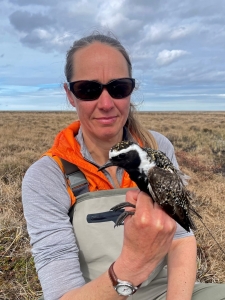
River Gates, Pacific Shorebird Conservation Initiative Coordinator, National Audubon Society. River joined Audubon in 2017 and has more than 20 years of experience in leading international shorebird conservation and research projects in the Pacific and East Asian-Australasian Flyways. She earned her M.S. in wildlife conservation from the University of Alaska Fairbanks in 2011, studying the breeding and migration ecology of Dunlin. River led the development of the Pacific Americas Shorebird Conservation Strategy and serves at the coordinator for the partnership. She advises shorebird conservation programs more broadly through her service on the following executive councils: U.S. Shorebird Conservation Partnership, Western Hemisphere Shorebird Reserve Network’s Hemispheric Council and Western Hemisphere Shorebird Group.
WHSG Staff Person
richard_lanctot@fws.gov
Richard Lanctot
Richard Lanctot is the Region 7 (Alaska) Shorebird Coordinator for the U.S. Fish and Wildlife Service. He  coordinates shorebird research and conservation across multiple flyways via the East Asian-Australasian Flyway Partnership, the Arctic Migratory Bird Initiative (part of the Conservation of Arctic Flora and Fauna work group of the Arctic Council), the Pacific Flyway Council, and the Western Hemisphere Shorebird Group. He conducts breeding and migration ecology of shorebirds, with a focus on understanding the factors that limit population size and growth.
coordinates shorebird research and conservation across multiple flyways via the East Asian-Australasian Flyway Partnership, the Arctic Migratory Bird Initiative (part of the Conservation of Arctic Flora and Fauna work group of the Arctic Council), the Pacific Flyway Council, and the Western Hemisphere Shorebird Group. He conducts breeding and migration ecology of shorebirds, with a focus on understanding the factors that limit population size and growth.
